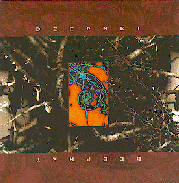
As each form of popular music devolves and dissolves into countless permutations of what has gone before, it is self-evident that there us a very real need to continuously diversify in order to forge an ever new vocabulary of sound, and to widen each new horizon.
Over the last two decades terms such as "Industrial" and "Ambient" amongst many others, have been applied to an ever increasing and ever more bewildering array of musicians, creating the illusion of a coherent and unified musical movement, while their only true connection has been that at one stage or another an observer considered their work challenging or differed, based on limited experience or reference. Such terms are merely convenient labels, and quickly become quite meaningless when applied to any and every music that has even the slightest variation on the standard structure of popular music.
It is appropriate to attribute the actual origins of modern sonic experimentation to the writing of the Futurist Manifesto "The Art Of Noises" by Luigi Russolo on March 11, 1913, in which her proposed that: "We break out of this limited circle of sounds and conquer the infinite variety of noise-sounds."
His suggestion that music embrace all forms of sound, from that of nature to that of a modern industrial society, with sirens and metal scraping, of dishes breaking or even the sounds of warfare, was considered too audacious by many.
In the same year Russolo wrote "Awaking of a City" the best known and most influential futurist anti-music, this work, along with that of his collaborator Filippo Tommaso Marinetti, evolved into the "Machine Music" of the nineteen twenties, from which was born true twentieth century music, with its manipulation of pure sound and the use of synthetic sound shaping processes, both of which were impossible before the advent of electronics.
While the likes of Stravinsky's "Re-Evaluation" made significant changes to the evolution of classical music, and the avante-garde where wholeheartedly embracing modern technology, there was very little impact outside the exclusive and comfortable circles of intellectuals and academics. It wasn't until the late nineteen sixties that the promise of a new music began to take popular hold, when a new breed of musician was evolving, born out of the post war generation with its thirst for the new. From the backgrounds as diverse as rock, jazz and classical, they were not afraid to break from the past and adopt the new electronic instrumentation, and used them to fashion their own musical heritage. The possibilities then hinted at, have been broadened even further with computer assisted sound manipulation and the use of the studio itself as an instrument. Those who embrace these and other possibilities are united in a quest to forge the new, as opposed to reconstructing the past, to independently evolve their own sonic language founded on a rapprochement between avante-garde aesthetics, radical politics and popular culture.
It seems inevitable that individuals with integrity are the only ones willing and able to pursue their own vision, whatever the outcome. Here are represented such individuals, who are at the very heart of a true alternative to the mundane, a worldwide deep network of friends, allies, and co-conspirators, who are both directly and indirectly influential on a more overtly commercial underground scene. These lonely voices, united within common goals and means, should not be confused with any scene or movement. These are the voices of the individual.
Brian Williams - February 1996